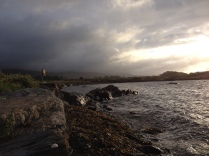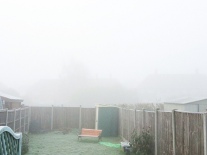There’s a beautiful trend happening. People are writing about their polytheisms, people whose polytheistic practices are diverse, varied, multiple, weird, different from what we’re told (recently) that polytheism ‘should’ be. (See Jack’s post here, and Kiya’s post here, and the wonderful My Polytheism blog which is collecting a lot of this writing – and I hear that Jolene Poseidonae wants more people to contribute to it!)
Like a lot of these brilliant writers, I have been really concerned by the gatekeeping and crypto-fascist stuff coming out of those who would paint themselves as ‘leaders’ of polytheism. As though it were a cult and they were the gurus. As though it were a singular religion, with rules that we all share, and which they can write.
For me, part of this mess has been positive. My Lady is pointing me at the roots of modern cultural polytheisms – roots which are mostly nationalistic and fascist, if we are completely honest – and asking me if that’s what I want to be part of, even as it moves beyond that. For that history will always be with it. I’m thinking about that, and it may take some time. These things can be transformed, She says – but is that the Work you want to do?
Because you see, my gods are not particularly bothered how I worship them and what I call myself. And my ancestors definitely aren’t. It’s for you, they whisper, and I, barely hearing them, shake my head like I were brushing off flies, and pour out my offerings on shrines that Irish gods never had, and that they certainly don’t have now. And what paltry offerings they are – whiskey and mead and scraps of food.
And they don’t mind – it’s what I need. And I believe they appreciate those little offerings, paltry as they are. But there’s a sense that, when I’m ready, there are far bigger things waiting for me outside the four walls of the room that houses my shrines to the beings of Light that dwell in the secret places of the land. And far, far bigger things waiting for me beyond the four walls of my current ways of thinking and doing and worshipping.
My gods do not live in any shrine inspired by modern polytheism. No offering of whiskey is enough for them, and no trinkets that remind me of them could ever fill the deep, dark spaces they have made in my heart.
Then what do you want? I ask, perturbed, frustrated.
You, whispers Beara, my dark Lady, whom I had the gall to name myself, whose tales I have twisted as she has led me to, in whom I have found a depth of chaos and justice that no constructs of ‘ancient lore’ can describe. For it can only be found in the places she dwells – in the wind in the trees, at the seashore in a storm, on a wild island, on the mountain. And in the deepest pool of chaos, beneath the Tree.
Anything (and everything) you want, says Dovinia, ancestress-goddess who crosses divides between land and people, and finds me lost, somewhere in the depths between.
The Adventure, winks Manannan mac Lir, who does not care if I put the accents on the right places in his name, for all names and stories could only ever be an echo of the sound of the sea on the rocks in a mighty storm – and a wry, friendly fisherman watching from the shore in a bright yellow hat, so easy to miss in the heavy rain. He offered me a box once and asked if I wanted to open it. I’m not sure I’ve even cracked the lid yet.
They ask me to challenge the deepest parts of myself that do not want to offer hospitality to the stranger (or wants to fetishise them* until my hospitality is far more about me than about them). The parts of me that withdraw into tribal instincts – where what is mine must stay pure and unsullied by others, and what is yours must be mine if I think it is good, and condemned as alien and wrong if I do not. The parts of me that are racist, colonialist, internally and externally disablist, internally and externally homophobic, transphobic, classist, elitist… the list goes on. The parts of me that secretly like that most of my gods are Irish and that I rarely venture out to meet others. That I rarely look beyond my little boxes. That I call myself a thing and ignore how it oppresses others. Because to look at that oppression is difficult, and may involve Work that I’m just too tired to do. (The parts of myself that use ‘I’m too tired’ as an excuse far, far too often.) They call me to challenge all these things in me, for only then can I even begin to challenge them in others.
This is my offering.
They ask me to give all of myself to a cause without end, from the depths of my frustration and pain, in disability campaigning that alienates me from my community – and leaves me deeply hurt, unsure if I should go on with such work that makes people stand against me, vocally, if very boringly. But I will, because order needs chaos, rising up from the dark pool beneath the Tree, or nothing ever changes. And Beara nods, and approves – but only long enough to ask for more.
This is my offering.
And they ask me to do the most simple things, that are the most difficult. Continuing to show up, even in the too-bright, scorching days of a summer ruled by Balor, where my world and my mind feels like it is falling apart. Keeping going, when the doctors are unkind and unhelpful, when the university administration is neglectful to the point of my desperation, when the mountain of work is terrifying to look up at. To keep pulling out that next transcript to analyse, Cuchullain-like (but with no super-strength to help). To accept the many gifts that They give me. To believe my spouse loves me. To keep lighting the candle on the shrine – because that is what I need, and my need is great.
This is my offering.
My polytheism is social justice. My polytheism is critical theory. My polytheism is Hannah Arendt and bell hooks and Sara Ahmed and Robert McRuer and Rosemarie Garland-Thompson and Sharon Betcher and Nancy Eiesland. My polytheism is stories – sharing the stories of those who are not heard, because my privilege means my voice is louder, and this is what I can do. My polytheism is research into disability and Christianity, that I have never walked away from in six long years, through circumstances having forced me to attend three universities, all of which have made it very hard to work as a disabled student – because I made a commitment, and because the stories of my participants need to be told. My polytheism is hospitality, keeping my vows, showing up, and really trying hard not to raid the cattle of others.My polytheism is the modern stories that inspire me that I am afraid others will laugh at, and so I relegate my feelings about those to other places, and pretend I am not inspired by Buffy and Angel and X-Men and Night Vale and a reimagined Narnia where a queen calls to me. My polytheism is not even sure it’s all that different from monotheism, some days, when the voice of the One whispers through and in the voices of the Many. My polytheism simply is, a belief in many gods, because many gods made themselves known to me. And oh, how they made themselves known!
My polytheism is nothing like yours. And that’s OK. It’s good. It’s beautiful.
Now please – tell me about yours?
(Don’t worry – part 3, on disability, miasma and polytheism, is still on the way… :) )
Image: ‘Bright Flame’ shrine. Images of Brighid and Our Lady Breaker of Chains, with flowers (from my garden) and candles, plus memorial and inspirational items.
*Currently reading Sara Ahmed on the fetishisation of the stranger. I recommend it.





